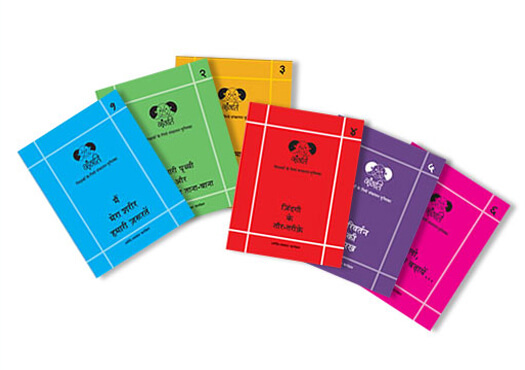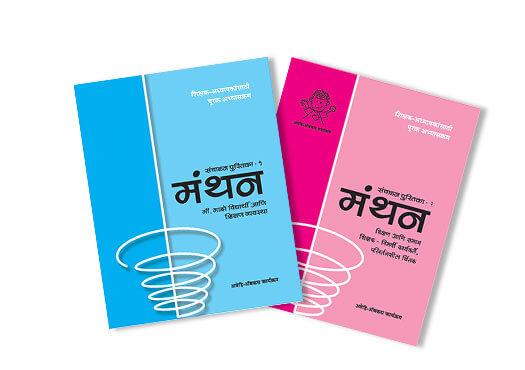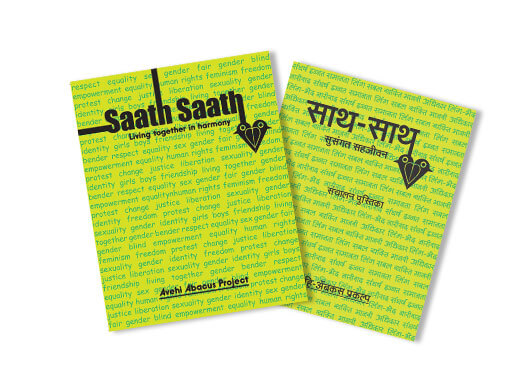It all began in 1952 on the banks of the River Narmada in a village in South Gujarat. Shanta Gandhi, an educator with eclectic interests, and diverse training in science, theatre, dance and politics had started working with a group of children in order to develop a curriculum that was relevant to their lives. The atmosphere was informal and the curriculum not pre-planned. It evolved organically in response to the needs of the group and as a result of her interaction with the children. Children asked questions about their surroundings, and the process of finding answers (through stories, games, songs and discussion) led naturally to questions regarding human evolution - how life emerged, why we are what we are, how our lives have changed from the past, and so on. Later the curriculum was further developed in an experimental school attached to the B.M. Institute of Child Psychology and Development in Ahmedabad in the mid 1950. Here again, it was not based directly on the formal school curriculum but attempted to supplemented it.
After a long interval, the programme was taken up in the 1970s at the Bal Bhavan, in New Delhi. Here government school children were provided an opportunity to interact with teachers, writers and artists, and to explore their surroundings through art, drama and dance, all the time asking questions and discovering the answers. Unfortunately there was another long break before the programme was revived in Mumbai by the Avehi Trust in the 1990s. Since then, the AVEHI ABACUS PROJECT has developed three integrated packages of educational materials for students and teachers in the formal as well as the non-formal streams of learning. These are Sangati, Manthan, and Saath Saath. The programmes seek to supplement and enrich the prescribed school curriculum, encouraging learners and teachers to actively engage with the world of knowledge both inside and outside school.
In 1990, the Avehi Public Charitable (Educational) Trust (APC[E]T) initiated the AVEHI ABACUS PROJECT (AAP) in Mumbai to strengthen the quality and content of education in primary schools. With Shanta Gandhi as Director of the AVEHI ABACUS PROJECT, the programme was now tried out in a formal school setting.
At Bal Bhavan, the programme had already been structured to move from an informal to a non-formal setting; now, it had to be further modified for students in the formal stream. Both in the informal and non-formal settings, there had been no constraint of time or of rigid classification of learners according to age groups. These factors had now to be taken into account in order to restructure the programme for use in ‘regular’ schools.
For five years from 1991 onwards, the AAP developed and tested a prototype at the Mahalaxmi Hindi-medium Municipal School in Mumbai. Beginning with students of Class III, the project worked with a group of about 35 children till their graduation from Class VII. Every week AAP facilitators conducted an hour-long session with these school children, to understand their responses and learn from them.
Based on this experience, and the realization that sustaining the programme would require the active involvement of teachers, the programme was modified again. Between 1996 and 2001, detailed session plans and visual materials were provided to teachers from 25 municipal schools, 35 NFE centres and two private schools. Training workshops were held with these teachers who then used the AAP materials in class. Their feedback was invaluable in giving shape to the final curriculum.
Thus when the Sangati series was launched in 2001, it was based on 10 years of experimentation with a variety of groups in different situations in the formal and non-formal sectors. This new series was organised in the form of six comprehensive teaching-learning kits for Classes V, VI and VII. Since 2006, Sangati has been integrated in the school timetable of all the 905 municipal schools in Mumbai for students from Classes V to VII.

The AVEHI ABACUS PROJECT has always responded to the current needs of schools, education and society.
While developing and testing the Sangati material we felt the need to work more closely with schoolteachers. We realized that teachers needed to be encouraged to look at their own roles afresh; that there is a serious need for educators to examine their understanding of education and society.
Despite the occasional acknowledgement by the government of the need for reforms, teacher education in India has remained virtually unchanged since colonial times, reflecting largely the colonial view of the teacher as simply a transmitter of a set curriculum, where knowledge is a ‘given’. The emphasis has remained on pedagogy, on teaching methodologies, rather than on engaging the teacher actively in shaping the content of the curriculum to make it contextually relevant and use it dynamically to achieve larger educational objectives. But recently, there have been many attempts at innovation in curricular structures and methodologies at the policy level. Of these, the most significant is the National Curriculum Framework 2005, which calls for improvement and enhancement of teachers’ skills. At the same time, the Right to Education Act of 2009 has thrown up new challenges.
We realized that any effort to reach out to teachers must form part of the professional training that they undergo, from the earliest possible stage. In other words, a Foundation Course for pre-service training – a course that would focus on the teacher’s role and their vital contribution towards making education truly meaningful. AVEHI ABACUS PROJECT thus responded by developing the Manthan curriculum for those who have enrolled for Diploma in Teacher Education (D.T. Ed.). It was tested in two Government recognized D.TEd. colleges with 200 students in Mumbai during the period 1998 to 2000. On the basis of feedback received from teacher-educators and trainee-teachers, the project initiated the process of reviewing and modifying the course from 2007. The project was granted permission by the Maharashtra State Council for Educational Research and Training for implementing the programme in Panvel DIET (District Institute of Educational Training) and 10 other affiliated colleges. Currently it is being used in 17 colleges in Palghar, Thane, Raigad and Mumbai in Maharashtra.
It is hoped that exposure to Manthan will lead to an exploration both of what is taught and how it is taught in schools so teachers will become reflexive practitioners, motivated to play a central role in transformative education.

The struggle for gender justice has grown and matured since the last century across the world as well as in India. Attitudes towards sexuality are also undergoing changes. However, there’s resistance to change, which can be seen in cases of violence against women. One of the reasons behind gender injustice is the way we bring up our children. Young people are rarely made aware of how insidious and deep set our ideas of gender roles and sexuality are, and how gender discrimination affects both sexes.
School is one of the key domains that can initiate positive changes but generally ideas of gender-justice remain on the surface even in curriculum and school culture. To fill this lacuna AVEHI ABACUS PROJECT developed Saath Saath – Living together in harmony, a teaching-learning module on gender and gender sensitivity with an aim to reach-out to middle-school students. Saath Saath addresses a variety of issues, ranging from how our ideas of gender are constructed, the way our body and mind undergo changes during adolescence, the pressure that both boys and girls face when required to conform to stereotyped gender roles, how the domains of family, work-space, and media enforce these stereotypes, leading to and justifying gender oppression and violence. It also focuses on the struggles against this injustice and the legal and social remedies what it means to be an empowered person and how we can empower ourselves and those around us.
In 2013 the Archdiocesan Board Of Education (ABE), Mumbai expressed its support by disseminating Saath Saath to about 280 schools under its purview and also organized workshops to orient their 150 teachers.
Since then the reach of Saath Saath has grown and has received positive response in mainstream media.

In 1990, the Avehi Public Charitable (Educational) Trust (APC[E]T) initiated the AVEHI ABACUS PROJECT (AAP) in Mumbai to strengthen the quality and content of education in primary schools. With Shanta Gandhi as Director of the AVEHI ABACUS PROJECT, the programme was now tried out in a formal school setting.
At Bal Bhavan, the programme had already been structured to move from an informal to a non-formal setting; now, it had to be further modified for students in the formal stream. Both in the informal and non-formal settings, there had been no constraint of time or of rigid classification of learners according to age groups. These factors had now to be taken into account in order to restructure the programme for use in ‘regular’ schools.
For five years from 1991 onwards, the AAP developed and tested a prototype at the Mahalaxmi Hindi-medium Municipal School in Mumbai. Beginning with students of Class III, the project worked with a group of about 35 children till their graduation from Class VII. Every week AAP facilitators conducted an hour-long session with these school children, to understand their responses and learn from them.
Based on this experience, and the realization that sustaining the programme would require the active involvement of teachers, the programme was modified again. Between 1996 and 2001, detailed session plans and visual materials were provided to teachers from 25 municipal schools, 35 NFE centres and two private schools. Training workshops were held with these teachers who then used the AAP materials in class. Their feedback was invaluable in giving shape to the final curriculum.
Thus when the Sangati series was launched in 2001, it was based on 10 years of experimentation with a variety of groups in different situations in the formal and non-formal sectors. This new series was organised in the form of six comprehensive teaching-learning kits for Classes V, VI and VII. Since 2006, Sangati has been integrated in the school timetable of all the 905 municipal schools in Mumbai for students from Classes V to VII.

The AVEHI ABACUS PROJECT has always responded to the current needs of schools, education and society.
While developing and testing the Sangati material we felt the need to work more closely with schoolteachers. We realized that teachers needed to be encouraged to look at their own roles afresh; that there is a serious need for educators to examine their understanding of education and society.
Despite the occasional acknowledgement by the government of the need for reforms, teacher education in India has remained virtually unchanged since colonial times, reflecting largely the colonial view of the teacher as simply a transmitter of a set curriculum, where knowledge is a ‘given’. The emphasis has remained on pedagogy, on teaching methodologies, rather than on engaging the teacher actively in shaping the content of the curriculum to make it contextually relevant and use it dynamically to achieve larger educational objectives. But recently, there have been many attempts at innovation in curricular structures and methodologies at the policy level. Of these, the most significant is the National Curriculum Framework 2005, which calls for improvement and enhancement of teachers’ skills. At the same time, the Right to Education Act of 2009 has thrown up new challenges.
We realized that any effort to reach out to teachers must form part of the professional training that they undergo, from the earliest possible stage. In other words, a Foundation Course for pre-service training – a course that would focus on the teacher’s role and their vital contribution towards making education truly meaningful. AVEHI ABACUS PROJECT thus responded by developing the Manthan curriculum for those who have enrolled for Diploma in Teacher Education (D.T. Ed.). It was tested in two Government recognized D.TEd. colleges with 200 students in Mumbai during the period 1998 to 2000. On the basis of feedback received from teacher-educators and trainee-teachers, the project initiated the process of reviewing and modifying the course from 2007. The project was granted permission by the Maharashtra State Council for Educational Research and Training for implementing the programme in Panvel DIET (District Institute of Educational Training) and 10 other affiliated colleges. Currently it is being used in 17 colleges in Palghar, Thane, Raigad and Mumbai in Maharashtra.
It is hoped that exposure to Manthan will lead to an exploration both of what is taught and how it is taught in schools so teachers will become reflexive practitioners, motivated to play a central role in transformative education.

The struggle for gender justice has grown and matured since the last century across the world as well as in India. Attitudes towards sexuality are also undergoing changes. However, there’s resistance to change, which can be seen in cases of violence against women. One of the reasons behind gender injustice is the way we bring up our children. Young people are rarely made aware of how insidious and deep set our ideas of gender roles and sexuality are, and how gender discrimination affects both sexes.
School is one of the key domains that can initiate positive changes but generally ideas of gender-justice remain on the surface even in curriculum and school culture. To fill this lacuna AVEHI ABACUS PROJECT developed Saath Saath – Living together in harmony, a teaching-learning module on gender and gender sensitivity with an aim to reach-out to middle-school students. Saath Saath addresses a variety of issues, ranging from how our ideas of gender are constructed, the way our body and mind undergo changes during adolescence, the pressure that both boys and girls face when required to conform to stereotyped gender roles, how the domains of family, work-space, and media enforce these stereotypes, leading to and justifying gender oppression and violence. It also focuses on the struggles against this injustice and the legal and social remedies what it means to be an empowered person and how we can empower ourselves and those around us.
In 2013 the Archdiocesan Board Of Education (ABE), Mumbai expressed its support by disseminating Saath Saath to about 280 schools under its purview and also organized workshops to orient their 150 teachers.
Since then the reach of Saath Saath has grown and has received positive response in mainstream media.


